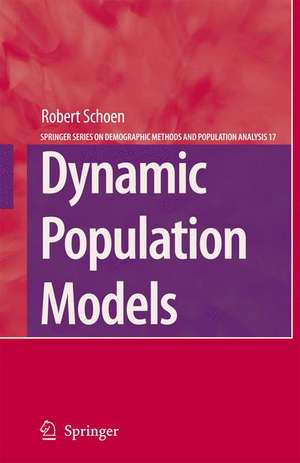Dynamic Population Models: The Springer Series on Demographic Methods and Population Analysis, cartea 17
Autor Robert Schoenen Limba Engleză Hardback – 21 mar 2007
The book is well organized and clearly written so that it is accessible to those with only a minimal knowledge of calculus. It begins with a review of fixed rate population models, from the basic life table to multistate stable populations. The process of convergence to stability is described, and the regularities underlying change in the size and composition of any population are explored. Techniques for estimating rates from multistate population distributions are presented, and new multi-age, multistate dynamic models are developed. Building on the logical closure of demographic models and the close relationship between population stocks and flows, the book sets forth the latest approaches for capturing population change in a world experiencing profound demographic transformations.
| Toate formatele și edițiile | Preț | Express |
|---|---|---|
| Paperback (1) | 924.30 lei 43-57 zile | |
| SPRINGER NETHERLANDS – 19 noi 2010 | 924.30 lei 43-57 zile | |
| Hardback (1) | 930.17 lei 43-57 zile | |
| SPRINGER NETHERLANDS – 21 mar 2007 | 930.17 lei 43-57 zile |
Din seria The Springer Series on Demographic Methods and Population Analysis
-
 Preț: 592.75 lei
Preț: 592.75 lei -
 Preț: 385.81 lei
Preț: 385.81 lei - 18%
 Preț: 931.86 lei
Preț: 931.86 lei - 15%
 Preț: 630.97 lei
Preț: 630.97 lei - 18%
 Preț: 936.20 lei
Preț: 936.20 lei -
 Preț: 394.10 lei
Preț: 394.10 lei -
 Preț: 385.99 lei
Preț: 385.99 lei - 18%
 Preț: 934.50 lei
Preț: 934.50 lei - 15%
 Preț: 650.50 lei
Preț: 650.50 lei - 15%
 Preț: 626.15 lei
Preț: 626.15 lei - 18%
 Preț: 933.10 lei
Preț: 933.10 lei - 15%
 Preț: 630.15 lei
Preț: 630.15 lei - 18%
 Preț: 933.59 lei
Preț: 933.59 lei - 15%
 Preț: 631.27 lei
Preț: 631.27 lei - 18%
 Preț: 1095.78 lei
Preț: 1095.78 lei - 18%
 Preț: 1354.28 lei
Preț: 1354.28 lei - 18%
 Preț: 934.33 lei
Preț: 934.33 lei - 15%
 Preț: 631.77 lei
Preț: 631.77 lei - 18%
 Preț: 933.71 lei
Preț: 933.71 lei - 18%
 Preț: 932.79 lei
Preț: 932.79 lei - 15%
 Preț: 630.64 lei
Preț: 630.64 lei - 15%
 Preț: 630.97 lei
Preț: 630.97 lei - 15%
 Preț: 631.77 lei
Preț: 631.77 lei - 15%
 Preț: 629.52 lei
Preț: 629.52 lei - 15%
 Preț: 634.11 lei
Preț: 634.11 lei - 15%
 Preț: 677.61 lei
Preț: 677.61 lei
Preț: 930.17 lei
Preț vechi: 1134.36 lei
-18% Nou
Puncte Express: 1395
Preț estimativ în valută:
178.02€ • 184.91$ • 147.87£
178.02€ • 184.91$ • 147.87£
Carte tipărită la comandă
Livrare economică 03-17 februarie 25
Preluare comenzi: 021 569.72.76
Specificații
ISBN-13: 9781402052293
ISBN-10: 1402052294
Pagini: 272
Ilustrații: XVI, 254 p.
Dimensiuni: 178 x 254 x 27 mm
Greutate: 0.56 kg
Ediția:2006
Editura: SPRINGER NETHERLANDS
Colecția Springer
Seria The Springer Series on Demographic Methods and Population Analysis
Locul publicării:Dordrecht, Netherlands
ISBN-10: 1402052294
Pagini: 272
Ilustrații: XVI, 254 p.
Dimensiuni: 178 x 254 x 27 mm
Greutate: 0.56 kg
Ediția:2006
Editura: SPRINGER NETHERLANDS
Colecția Springer
Seria The Springer Series on Demographic Methods and Population Analysis
Locul publicării:Dordrecht, Netherlands
Public țintă
ResearchCuprins
Population Models With Constant Rates.- Convergence to Stability.- Population Momentum.- Demographic Change at the Margin.- Longevity and Dynamic Mortality.- Timing Effects on Fertility, Marriage, and Divorce.- Dynamic Birth-Death (Multi-Age) Models.- Dynamic Multistate Models.- Dynamic Models With Multiple Ages and~States.
Recenzii
From the reviews:
"The book is a rich collection of results on demographic models addressing the implications of the dynamics of demographic rates. ... is provided with a list of thoroughly prepared exercises, which will be helpful for those who might use the book for study or for teaching mathematical demography. All appendices are very useful supplements. … the book is a good addition to the Springer Series. I would recommend it to those interested in mathematical demography both for reading, and as a collection of useful results." (Dalkhat M. Ediev, European Journal of Population, Vol. 24, 2008)
"With over 100 end of chapter exercises … and a very clear style, it is accessible to graduate students in demography with a good background in linear algebra and differential and difference equations. For experts, it provides a fine survey of the most used mathematical models in demography, with many practical applications. … I learned a lot from reading this book, and if you are interested in mathematical demography, you will too." (Roy Gardner, Zentralblatt MATH, Vol. 1151, 2009)
"The book is a rich collection of results on demographic models addressing the implications of the dynamics of demographic rates. ... is provided with a list of thoroughly prepared exercises, which will be helpful for those who might use the book for study or for teaching mathematical demography. All appendices are very useful supplements. … the book is a good addition to the Springer Series. I would recommend it to those interested in mathematical demography both for reading, and as a collection of useful results." (Dalkhat M. Ediev, European Journal of Population, Vol. 24, 2008)
"With over 100 end of chapter exercises … and a very clear style, it is accessible to graduate students in demography with a good background in linear algebra and differential and difference equations. For experts, it provides a fine survey of the most used mathematical models in demography, with many practical applications. … I learned a lot from reading this book, and if you are interested in mathematical demography, you will too." (Roy Gardner, Zentralblatt MATH, Vol. 1151, 2009)
Textul de pe ultima copertă
Dynamic Population Models is the first book to comprehensively discuss and synthesize the emerging field of dynamic modeling, i.e. the analysis and application of population models that have changing vital rates. Incorporating the latest research, it includes thorough discussions of population growth and momentum under gradual fertility declines, the impact of changes in the timing of events on fertility measures, and the complex relationship between period and cohort measures. Recently developed models for the analysis of changing mortality are examined, and generalizations of Lotka’s fixed rate stable population model are developed and applied.
The book is well organized and clearly written so that it is accessible to those with only a minimal knowledge of calculus. It begins with a review of fixed rate population models, from the basic life table to multistate stable populations. The process of convergence to stability is described, and the regularities underlying change in the size and composition of any population are explored. Techniques for estimating rates from multistate population distributions are presented, and new multi-age, multistate dynamic models are developed. Building on the logical closure of demographic models and the close relationship between population stocks and flows, the book sets forth the latest approaches for capturing population change in a world experiencing profound demographic transformations.
The book is well organized and clearly written so that it is accessible to those with only a minimal knowledge of calculus. It begins with a review of fixed rate population models, from the basic life table to multistate stable populations. The process of convergence to stability is described, and the regularities underlying change in the size and composition of any population are explored. Techniques for estimating rates from multistate population distributions are presented, and new multi-age, multistate dynamic models are developed. Building on the logical closure of demographic models and the close relationship between population stocks and flows, the book sets forth the latest approaches for capturing population change in a world experiencing profound demographic transformations.
Caracteristici
State-of-the-art presentation of mathematical (or formal) demography Detailed discussion of population momentum Thorough treatment of timing effects on demographic behavior In-depth analyses of regularities in populations with changing rates Clear and complete explanations with a minimum of mathematical complexity















